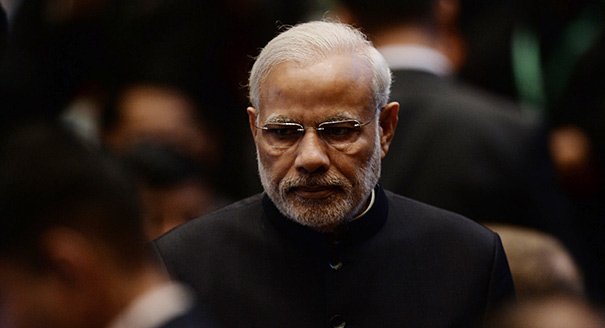Ashley J. Tellis
{
"authors": [
"Ashley J. Tellis"
],
"type": "legacyinthemedia",
"centerAffiliationAll": "dc",
"centers": [
"Carnegie Endowment for International Peace",
"Carnegie India"
],
"collections": [],
"englishNewsletterAll": "",
"nonEnglishNewsletterAll": "",
"primaryCenter": "Carnegie Endowment for International Peace",
"programAffiliation": "SAP",
"programs": [
"South Asia"
],
"projects": [],
"regions": [
"South Asia",
"India"
],
"topics": [
"Political Reform",
"Economy",
"Foreign Policy"
]
}
Source: Getty
Invoking the Beginnings of a Long Quest
Prime Minister Narendra Modi’s accomplishments in foreign policy offer hope that similar achievements can be produced at home.
Source: Hindustan Times
Prime Minister Narendra Modi seeks to transform India from being merely an influential entity into one whose weight and preferences are defining for international politics.
Less than a year after he took office in May 2014, he challenged his senior diplomats “to help India position itself in a leading role, rather than [as] just a balancing force, globally.” In other words, to have India become a great power.This is a laudable vision — and quite overdue. For far too long, leaders in New Delhi have conceived of India as a celebrated civilisation or as a grand experiment, but rarely as a great power.
There is much that India still has to do to ascend to this pinnacle. True great powers are not distinguished in the first instance by the strength of example or even by superior military capabilities, important though those may be. They are marked instead by the possession of exceptional material capabilities, which arise invariably from the presence of effective governments presiding over energetic societies. It is this interaction between State and society that enables them to generate resources faster and more effectively than their rivals and by so doing become genuinely ‘great’ powers.
Although Indian leaders did occasionally voice a desire for great power status, they did not exhibit any great appetite for it; they certainly did not make the investments necessary to build a strong State; and while they obviously sought a productive economy, they pursued counterproductive strategies toward that end. As a result, they forfeited the high growth that would have enabled India to rapidly defeat pervasive poverty, amass significant national wealth, and ultimately procure those military capabilities necessary to protect its interests beyond its borders.
To be sure, India did many things right. It preserved its territorial integrity despite multiple threats; it forged a unified nation despite bewildering diversity; and it created pockets of technological excellence despite weak economic performance. But it lost the opportunity to build efficient markets that would have encouraged innovation, competitiveness, and growth, even as decay in the political system over time slowly corroded the rule of law, weakened property rights, engendered stifling corruption, and impeded the speedy administration of justice — all of which combined to deny India the material success that would have produced great power status rapidly.
These failures left India with debilitating development problems and oriented its foreign policy toward preventing the international system from undermining its security rather than moulding the wider world to advance India’s interests.
Although India’s economic performance has improved dramatically in recent years, it is still unclear whether this impressive record is sustainable over the long term. The capital, labour, productivity and technological constraints on Indian growth are still considerable, and its institutional weaknesses — including its inability to set and achieve strategic goals — are quite profound.
All this creates a risk that India could become a consequential player internationally over time, but not necessarily a great power: Meaning a State that determines not simply important outcomes in, but the very configuration of, the global system.
If Modi’s vision of India as a leading power is therefore to be realised, he must strengthen what India has most successfully achieved thus far — liberal democracy and civic nationalism — while eliminating the hindrances within its economy and strengthening the capacity of the Indian state.
Modi’s remarkable accomplishments in foreign policy offer hope that similar achievements can be produced at home. In fact, domestic success is imperative because without a large reservoir of material resources, India is unlikely to prove sufficiently persuasive abroad.
Nor will it possess the wherewithal that enables it to provide global public goods — an important means of earning international loyalty — or project military power beyond its immediate neighbourhood.
Modi understands these realities all too well. It is not surprising, therefore, that he has sought to embark on difficult reforms, even if some have thus far been stillborn. He must nevertheless stay focused on completing India’s economic renewal, which requires repositioning the Indian State within the national economy while simultaneously strengthening it. The current strategy of “persistent, encompassing, and creative incrementalism” is not at all inappropriate, provided it remains relentless, comprehensive and ingenious in its pursuit of liberalisation. In particular, Modi needs to articulate the importance of this objective in ways that are comprehensible to the polity at large because there are few leaders in India today who have the capacity to do so persuasively.
Modi’s invocation that India become a leading power, consequently, represents the beginning of a long quest. His call offers transformative possibilities if it drives the speedy acquisition of great power capabilities and makes their procurement the considered object of Indian national policy. If this vision takes root, the foundations would be laid for making difficult decisions about economic reform domestically; containing those elements on both the right and the left that would disfigure India’s democracy and retard its development, respectively; and articulating a clear perspective of India’s role in Asia and the world without either defensiveness or hubris.
The stage would also be set for cementing the strategic partnerships that India has sought to build in furtherance of its own interests, taking the initiative in developing cooperative solutions that address the most pressing regional and global challenges, and building the military capabilities necessary to protect India and to provide the public goods needed to strengthen peace and security throughout the Indo-Pacific. Pursuing these objectives purposefully would provide the clearest indication that India is indeed serious about becoming a real great power.
About the Author
Former Senior Fellow
Ashley J. Tellis was a senior fellow at the Carnegie Endowment for International Peace.
- Multipolar Dreams, Bipolar Realities: India’s Great Power FuturePaper
- India Sees Opportunity in Trump’s Global Turbulence. That Could Backfire.Commentary
Ashley J. Tellis
Recent Work
Carnegie does not take institutional positions on public policy issues; the views represented herein are those of the author(s) and do not necessarily reflect the views of Carnegie, its staff, or its trustees.
More Work from Carnegie Endowment for International Peace
- Europe on Iran: Gone with the WindCommentary
Europe’s reaction to the war in Iran has been disunited and meek, a far cry from its previously leading role in diplomacy with Tehran. To avoid being condemned to the sidelines while escalation continues, Brussels needs to stand up for international law.
Pierre Vimont
- India Signs the Pax Silica—A Counter to Pax Sinica?Commentary
On the last day of the India AI Impact Summit, India signed Pax Silica, a U.S.-led declaration seemingly focused on semiconductors. While India’s accession to the same was not entirely unforeseen, becoming a signatory nation this quickly was not on the cards either.
Konark Bhandari
- Beijing Doesn’t Think Like Washington—and the Iran Conflict Shows WhyCommentary
Arguing that Chinese policy is hung on alliances—with imputations of obligation—misses the point.
Evan A. Feigenbaum
- A China Financial Markets PostCommentary
Description of the post.
Michael Pettis
- How Far Can Russian Arms Help Iran?Commentary
Arms supplies from Russia to Iran will not only continue, but could grow significantly if Russia gets the opportunity.
Nikita Smagin









